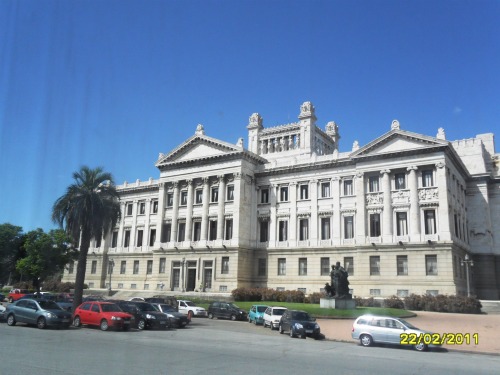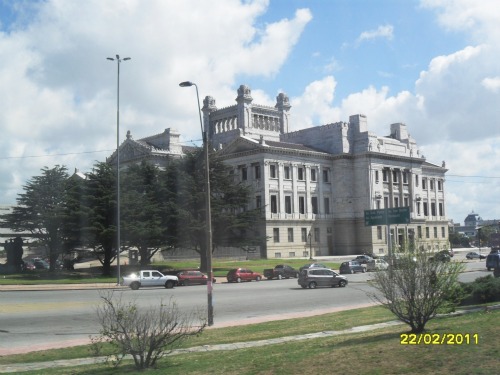Fascinating Facts about the
Uruguay Government System
|
|
The Uruguay government has been a leader when it comes to introducing the business and international world to their country. Today people with an interest in business are as eager to learn more about the South American country of Uruguay as those individuals who are just interested in enjoying a great vacation.
Government officials of Uruguay are proud to announce that their country has long been a favorite of many who wanted a unique holiday with the chance to explore this wonderful region. Lately, however, the government of Uruguay has been championing this South American country as a prime site for establishing new business concerns.
The country is developing a well deserved reputation for being a place where businesses are enthusiastically welcomed. There are many features of the land, culture and the government which make this country a leading site for new business development.
With a population of about 3.5 million, approximately one-third of whom reside in the capital city of Montevideo Uruguay or its surrounding areas, beautiful Uruguay, located in southeastern South America, is one of the most economically developed countries in South America, as well as one of the freest in terms of politics and labor.
Uruguay is attracting a great deal of small and large business interest and seems poised to become a true economic leader among South American countries.
In Recent years, the Uruguay government has been a major part of the country's economic success. Democratic principles are strong here, and the people are discovering that the key to earning a great reputation among top industries is to encourage an open and free Uruguay government system.
The government of Uruguay currently consists of a multiparty presidential representative democratic republic. This governmental system scores an 8.08 on the Democracy Index, putting it 23rd among 30 countries deemed to be full democracies in the world. The government of Uruguay was also ranked 27th on Freedom House's "Freedom of the World" index.
The President of Uruguay, along with the vice-president on the same ticket, is elected by popular vote for a 5-year term. According to terms developed by the Uruguay government the president is able to appoint 13 cabinet ministers to head various executive departments.
The General Assembly is an integral part of the Uruguay government and it consists of the Chamber of Deputies, which has 99 members elected by proportional representation for a 5-year term, and the Chamber of Senators, which has 31 members elected by the vice-president and proportional representation for a five-year term.
88% of the People of Uruguay are of European descent, primarily Spanish and Italian. Though the official language is Spanish, Uruguayan Spanish also shows some definite Italian influences. English has become a very common language that is encountered in many Uruguayan businesses.
Uruguay government officials proudly boast of their country's high literacy rate of 97.3% (49th in the world, along with Spain).
 The country also has a large (and expanding) urban middle class. While many Uruguayans consider themselves to be Roman Catholic, Uruguay is still considered the most secular country in South America, and the majority of the population does not practice religion on a regular schedule.
The country also has a large (and expanding) urban middle class. While many Uruguayans consider themselves to be Roman Catholic, Uruguay is still considered the most secular country in South America, and the majority of the population does not practice religion on a regular schedule.
The Uruguay economy, having grown 5% annually from 1996-1998, the Uruguayan government saw the economy suffer greatly from 1999-2002 due largely in part to spillover effects from Argentina and Brazil.
When bank assets froze in Argentina, many Argentinians withdrew massive amounts from their Uruguayan government accounts, leading to a Banking crisis in Uruguay, inflation, and other economic problems.
However, with help from the International Monetary Fund (IMF), the Uruguay government rebounded and the country has since seen 8% growth annually in recent years.
Uruguay's economy is based largely on Trade and agriculture, namely beef, fish, rice, wheat, and soybeans. However, it has also benefited from recent increase in interest in agri-tourism, which is a type of vacation that involves visiting a farm or ranch.

Besides agri-tourism, many other types of vacations draw as many as 1.8 million tourists to Uruguay each year. The secluded Uruguay beaches on the Atlantic coast are big attractions and the Uruguay government works hard to promote the beautiful cities on the Rio Uruguay, such as Salto, Fray Bentos, and Paysandu.
Reservoirs, lakes, and the Rio Negro invite windsurfers, fishermen and other sporting enthusiasts. The capital city of Montevideo is also a wonderful place to visit.
Established in 1726, the city has a rich architectural heritage and is home to many artists, writers, and musicians.
Visitors can enjoy a delicious variety of native foods based on Uruguay's Mediterranean influences; catch a Uruguay soccer game ; or go out for an evening of music, entertainment and dancing.
The country's many tourist attractions and spectacular scenery are highlights of any visit for both casual guests and businessmen.
However the overt democratic Uruguay government and hospitality of the people make Uruguay an ideal destination to consider as an integral part of any business venture from the smallest company to the largest industry.











Bookmark Us